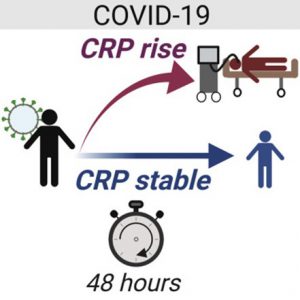Rapid Changes in Biomarker of Inflammation May Be a Key Predictor of COVID-19 Outcomes
Predicting the course of a COVID-19 patient’s disease after hospital admission is essential to improving treatment. Researchers at Brigham and Women’s hospital (BWH) analyzed 100 COVID-19 patients’ levels of inflammation, known to be associated with severity of illness, by looking at C-reactive protein (CRP) levels. Their results published in Cell Reports Medicine, showed that an increase in CRP in the first 48-72 hours of hospitalization increased respiratory deterioration and the possibility of intubation. If the levels of CRP remained steadier the condition of the patients remained more stable.
CRP and Its Role in Inflammation

Photo Credit: Mueller AA et al., Cell Rep Med. 2020 Oct 29:100144.
C-reactive protein (CRP) is a protein found in blood plasma, whose circulating concentrations rise in response to inflammation. Inflammation is a broad term that describes the release of chemicals involved in immune responses. Specifically, CRP tests integrate signals from a number of different proteins involved in inflammation, called cytokines and allow for physicians to get a clear snapshot of the patient’s inflammatory activity within a matter of hours.
In results of these findings from 100 COVID-19 patients, physicians at BWH have now changed their guidelines on CPR tracking. They now test for it every day for the first three days of hospitalization. This allows to identify more vulnerable patients and keep a close eye on their inflammation.
Researchers looked further into measuring the cytokine IL-6; which resulted in an increase during the first 24-48 hours which correlates to CRP levels and the progression of the disease. Researchers believe if you treat patients with tocilizumab, an IL-6 receptor, day 1 can reduce CRP levels and reduce inflammation.
In conclusion, Dr. Edy Yong Kim, MD, PhD, of the Division of Pulmonary and Critical Care Medicine at BWH hopes that these findings will help front-line workers better understand the volatility of COVID-19 patients’ conditions and reduce the severity of the disease. Cautiously monitoring levels of CRP, can predict which patients will need more medical care and help the public health officials as this global pandemic continues.
Related Research
Do you work in this field of research? If so, you may be interested in viewing our other reagents that might be related to COVID-19. Some of the reagents include:
- Coronavirus Reagents
- Anti-SARS-CoV Spike Protein [S391] Antibody from National Jewish Health
- Coronavirus Antibodies from our sister company Absolute Antibody
- Il-6 Antibody from the USDA


